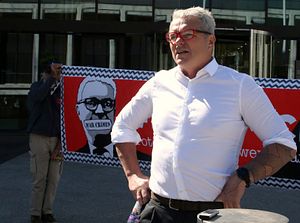An Australian army whistleblower charged with leaking secret documents alleging misconduct in Afghanistan said on Thursday he would defend himself at trial next year rather than face potential delays by hiring a lawyer with a security clearance.
David William McBride, 55, appeared briefly in the Australian Capital Territory Supreme Court on charges relating to the leaking of classified documents about Australian Special Air Service involvement in Afghanistan to Australian Broadcasting Corp. (ABC) reporters.
Registrar Annie Glover continued McBride’s bail until he appears in court next on Monday.
Glover also said the ABC’s application to keep McBride’s trial open to the public and media would be back in court on November 21.
McBride, a former military lawyer, said outside court that while he had been offered legal aid, he had decided to represent himself.
“The government said you can only have a lawyer who has a top secret security clearance and we will decide who gets a top secret security clearance,” McBride told reporters.
“So it gave them the ability to stretch the trial out for two years after they reviewed the person and then saying at the end of the two years, disingenuously: ‘Oh well, the person didn’t pass. You’re back to the drawing board,'” McBride said.
“I’m not going to put myself especially in the Department of Defense’s hands because I don’t trust them,” he added.
McBride said he intended to call as witnesses Attorney-General Christian Porter, Governor General David Hurley, who is also a former chief of defense, as well as another former chief of defense, a former defense department secretary, and a former defense minister.
He admits to leaking documents that formed part of the basis of an ABC investigation broadcast in 2017 about Australian special forces in Afghanistan. The ABC reported growing unease in the Australian Defense Force leadership about the culture of special forces and that Australian troops had killed unarmed men and children in 2013.
McBride says that he made an internal complaint first. In June he told The Guardian, “I made an internal complaint, I even went to the police first, I invoked whistleblower protections.” In July, he told media, “After my complaint they did an inquiry, but my career went downhill over that.”
McBride contacted the ABC after his internal complaints went nowhere.
The leak was the target of a police raid on ABC headquarters in Sydney in June 2019. Police raided the Canberra home of a News Corp. Australia reporter a day earlier in search for unrelated classified documents. The raids were condemned as media intimidation and sparked criticism of an increasing culture of secrecy in Australian institutions.
In late October, Australian media launched the “Your Right to Know” campaign — with nearly every major paper running a heavily redacted cover to protest government restrictions on media.
McBride is not the only attempted whistleblower in Australia to face allegations of leaking classified information after being frustrated by internal complaint processes. As Joshua McDonald explained recently for The Diplomat:
Bernard Collaery, a barrister and former attorney general of the Australian Capital Territory who is facing jail time for helping to expose Australia’s bugging operation of Timor-Leste during the 2006 negotiations to carve up oil and gas resources, has said that the current system gave whistleblowers no real outlet to raise concerns.
Another whistleblower, Richard Boyle, made an internal complaint under the Public Interest Disclosure (PID) Act to the Australian Taxation Office regarding the office’s ability to seize funds from private bank accounts. His complaint was investigated and dismissed, after which he went to the press.
The Australian Defense Force Inspector-General, an independent office that monitors military justice, is examining allegations that elite Australian troops committed war crimes in Afghanistan from 2006 and 2014.
McBride’s trial date is expected to be set in March or April.
By Rod McGuirk for the Associated Press, with additional reporting by The Diplomat.

































